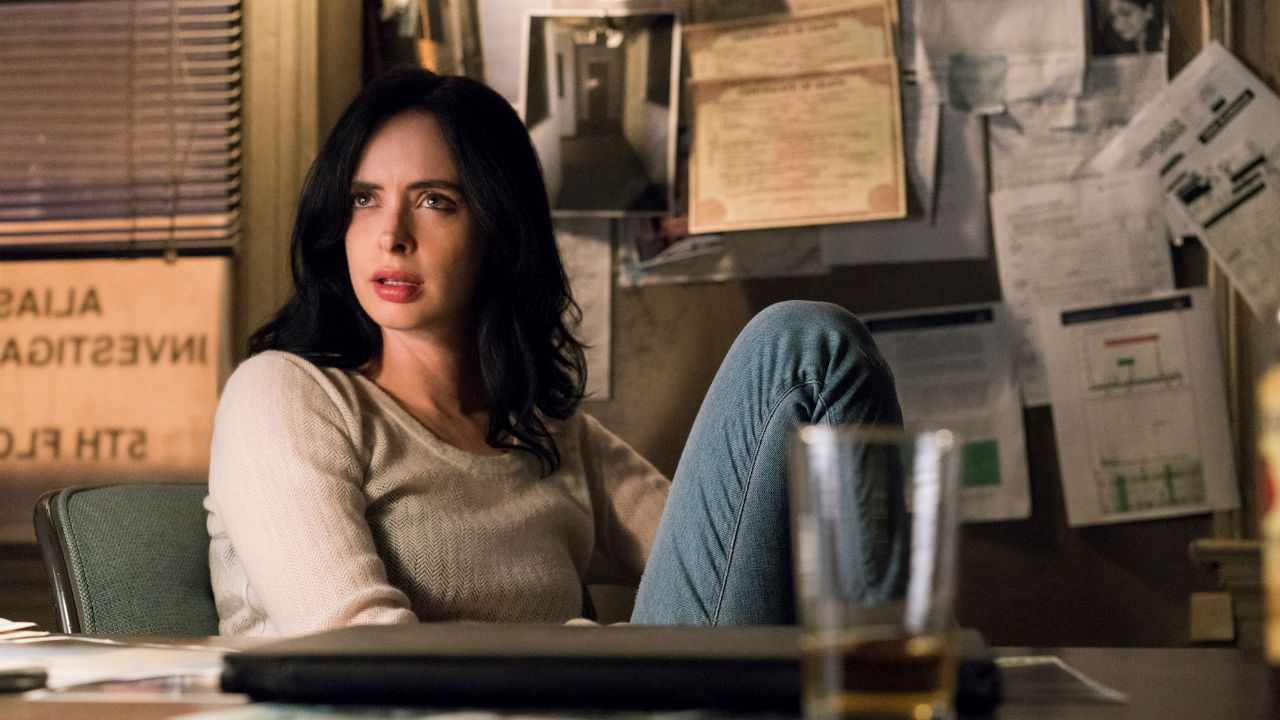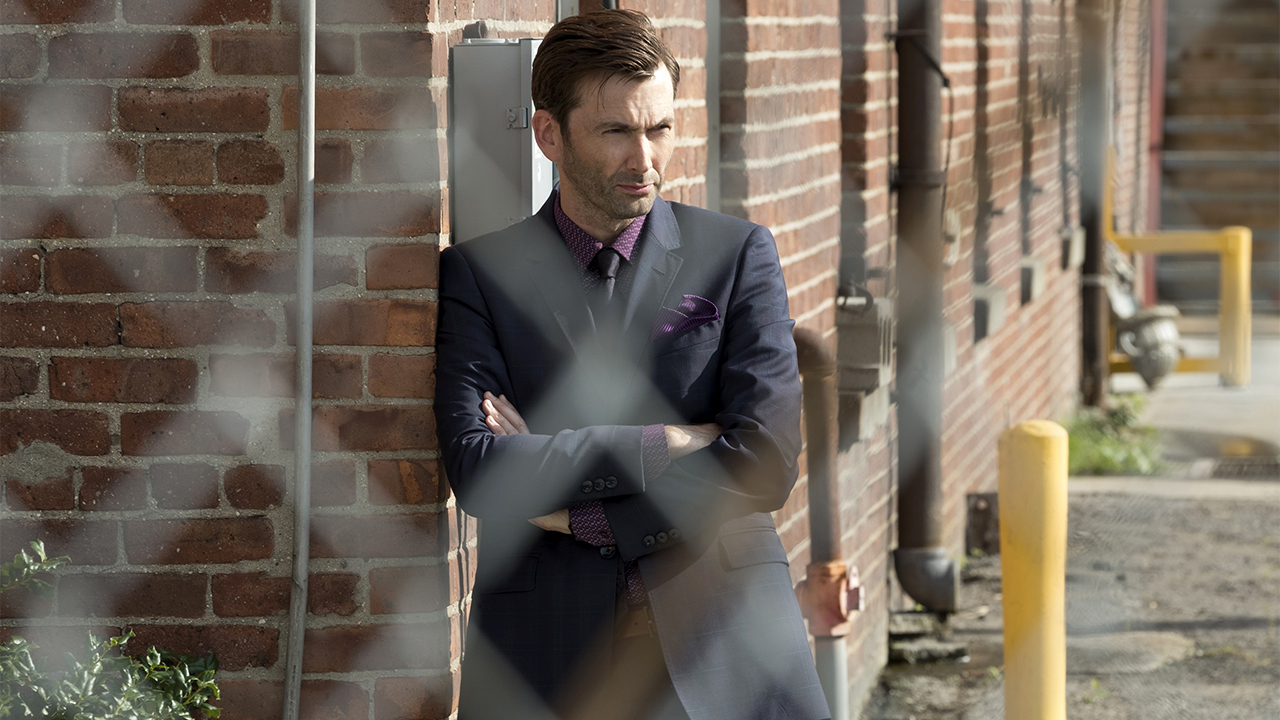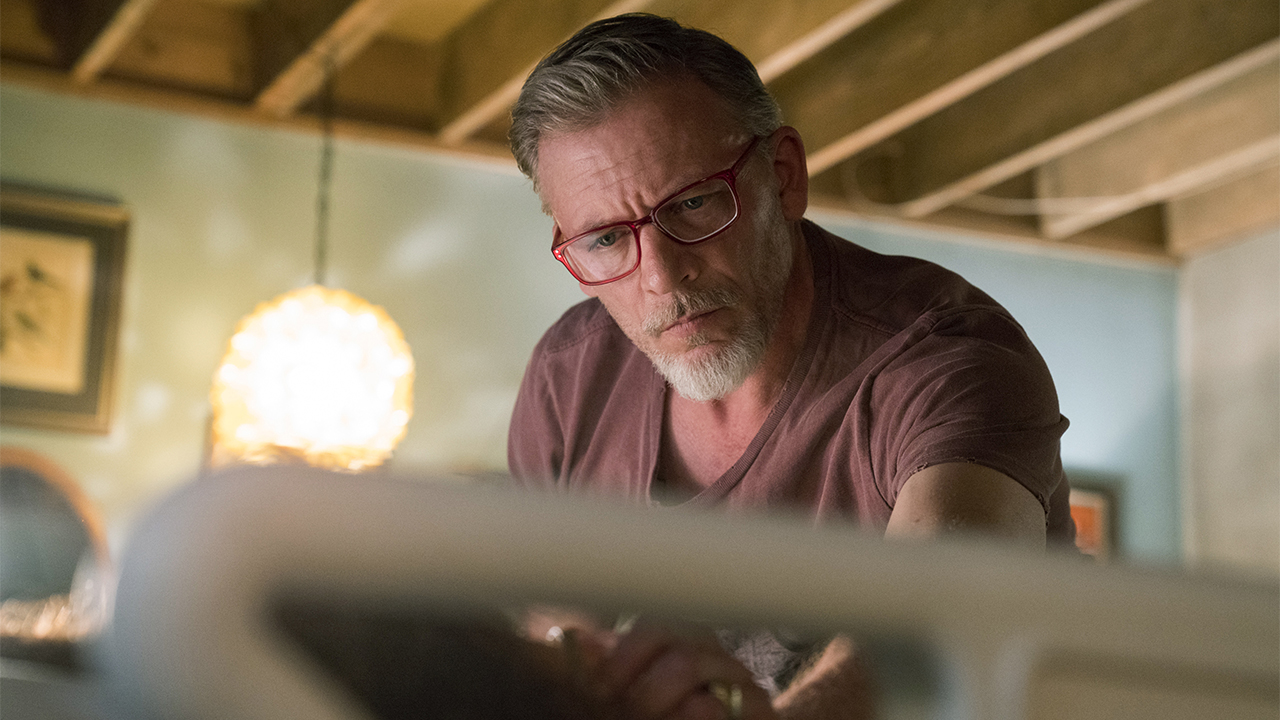GamesRadar+ Verdict
Everyone’s favourite troubled hero is back and on top form, but the lack of a major villain will be a problem for most.
Why you can trust GamesRadar+
Second seasons can be tricky, but Jessica Jones is more than up for the challenge with her alcoholic charms and (non-existent) people skills. When your first season is such a success it can be hard to comeback with another, which is just as good, but offers something new - and Jessica Jones season 2 definitely suffers from this curse - but thankfully, the core of what makes this hero so beloved is still going strong and thanks to some skillful performances and emotional storylines, season 2 secures its place as one of the best Marvel-Netflix TV shows around. Read on for my full season review, but be warned, major spoilers to follow.
After the events of season 1 (and The Defenders) Jessica is back working as a private investigator and enjoying a drink or ten on the job - business as usual, in other words - and the first few episodes play out in a very similar fashion to the first season, as she continues to push everyone away. Given how good the first season of Jessica Jones is, there are worse things than seeing it all again from a slightly different perspective, but it does feel a little dry after a while and you find yourself wanting a new story to take over. While these familiar steps remind us that Kilgrave is not the root of all of Jessica’s problems, the showrunners needed to find a way to retrend this familiar path in a compelling way - and they do, but not until a little later in the season. Basically, hang in there.
Luckily, while Jessica is still in her drink-fuelled haze, the series’ secondary characters show real development with Malcolm drug-free and obsessed with becoming an expert PI and Trish determined to support the powered community. Both of their storylines are fascinating as they twist and turn around Jessica’s own arc, as well as each others, but Trish in particular really comes into her own in season 2. And not in a good way… Any idea that she’s merely Jessica’s sidekick go right out the window as she tries desperately to force Jess to be the hero she wants, and then, when that doesn’t work, become that hero herself through ‘questionable’ means. Jeri too goes on a whirlwind of a journey as she’s diagnoised with ALS and starts to question how she’s lived her life, but if you love the cold-hearted character just the way she is, don’t worry, she’s still the same harsh, strong female lawyer we all secretly admire and her rollercoaster of a character arc will have you rooting for her to win.
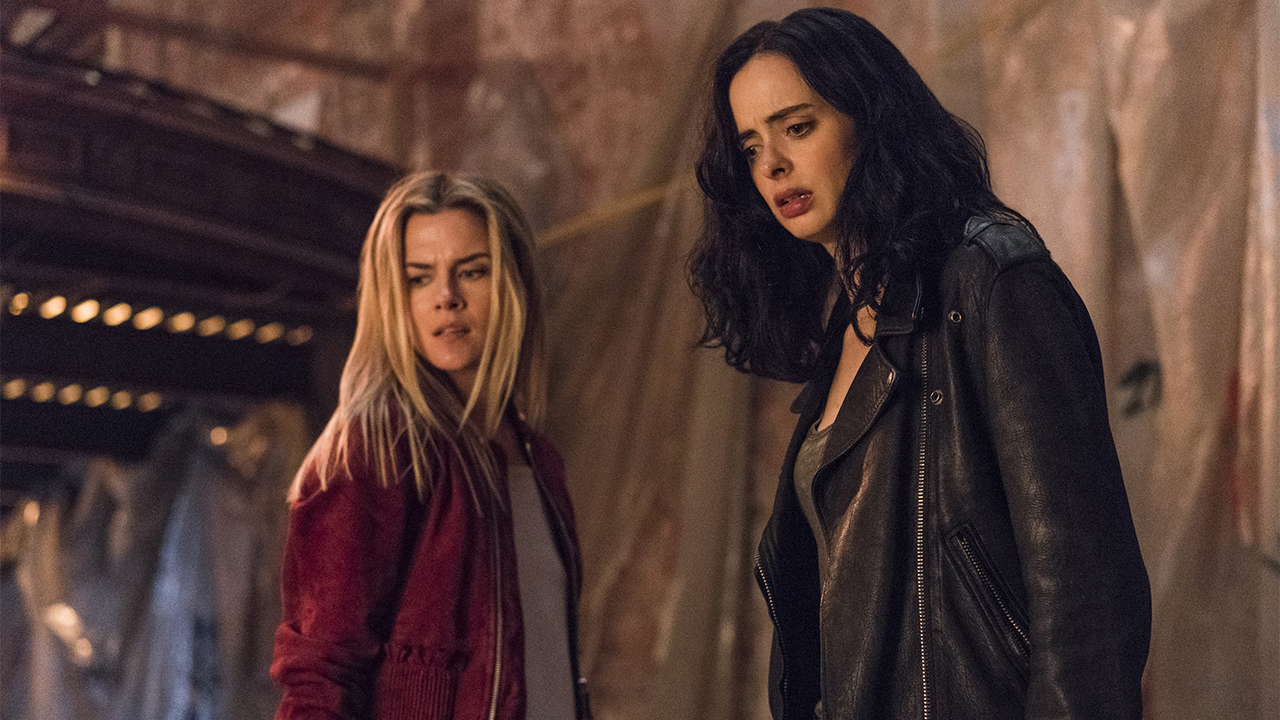
Jessica’s real development comes with the introduction of her mother. Oh wait, isn’t she dead? Nope! (I did say there would be spoilers.) In season 2, Jessica Jones - a show which is very much about women (well, actually it’s about a lot of things, but more importantly, it’s about things from a female perspective) - decides to tackle that oh-so interesting of female relationships: the mother/daughter bond. In other words; it’s complicated. Battling with her own fear that she’s a killer, Jessica comes face-to-face with her long lost mother - perhaps the thing she’s wanted most in the world - only to find out that she’s a murderer. Talk about irony. As Jessica struggles to forgive her mum (for leaving her, and the murder), she jumps between giving her up, killing her, and saving her. The struggle is very real. As one character says, the bond between a mother and daughter is a unique thing and this series shows how true that is.
Janet McTeer’s performance as Alisa Jones really saves Jessica from being just a boring repetition of her season 1 character and fans will enjoying seeing the similarities between the two. You start the realise that Jessica isn’t just a blunt, sarcastic, arsehole because of what she’s been through, but because that’s just who she is, and that’s who she had as a role model growing up… and maybe that’s ok. One of my favourite things about Jessica Jones is that it very much supports the idea that women don’t have to be well-behaved and polite and Alisa embodies this just as much as her daughter does.
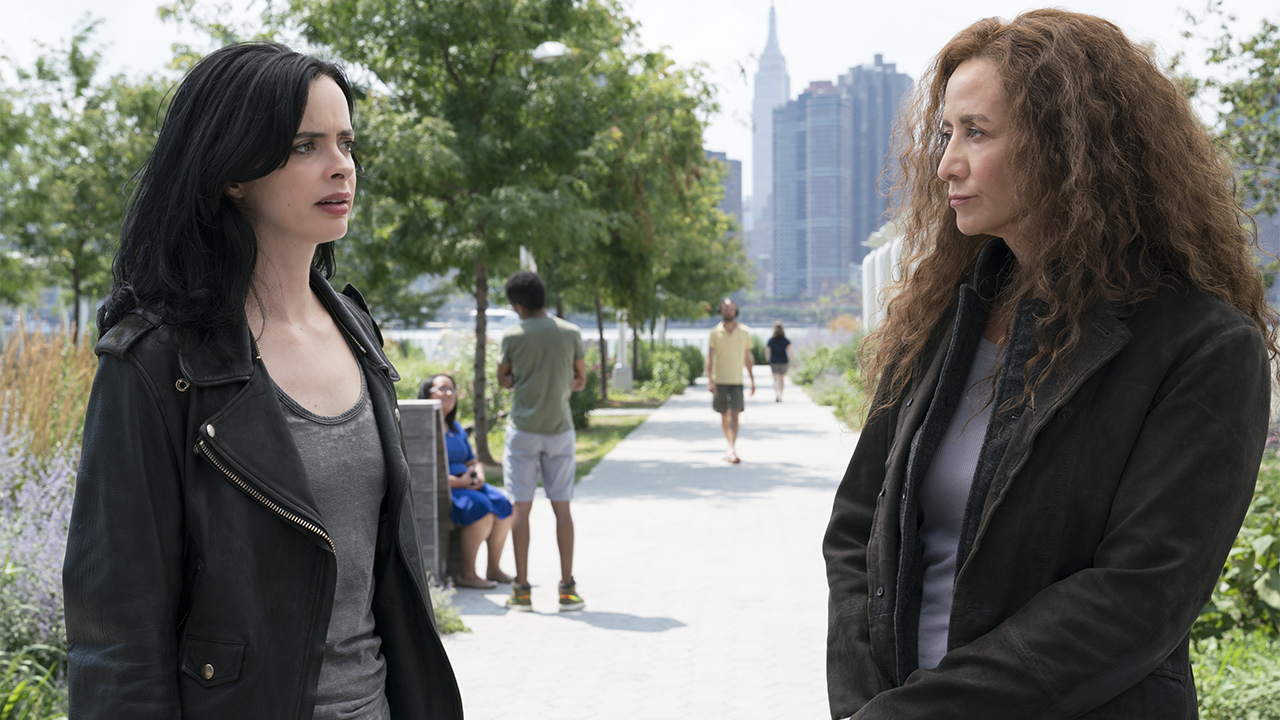
As for the other new faces of season 2, although everyone puts in expert performances, there’s nothing much to write home about. Competing PI Pryce Chang (Terry Chen) joins this season, but acts as little more than a distraction in the early episodes and is all but forgotten for the rest of the season until the very end. Dr. Karl Malus (Callum Keith Rennie) is the scientist who treated both Jessica and her mum and gave them superpowers, and while his relationship with Alisa is very touching at times, the story isn’t really about him. Finally, Oscar (J.R. Ramirez) is Jessica’s new love interest in this season and while it’s pleasing to see their relationship doesn’t just follow the traditional TV romance guidelines, I still found myself questioning why she needed a love interest at all.
But I know who you really want to hear about... The Purple Man. Despite the demise of David Tennant’s truly brilliant villain in season 1, speculation was rife that he would return in season 2, even before the promo images and the trailer featuring Kilgrave were released. If you were worried that the show would fall back on the charms of the cruel but addictive villain and bring him back to life in some ridiculous way, you can breathe easy. That’s not what happens. In fact, he only appears in one episode, in flashback form, and in response to a specific trauma Jessica goes through, which not only makes his appearance justified, but explains his subsequent disappearance too. Phew! It goes without saying that it’s a joy to see Kilgrave and Jessica back together again, but thankfully the series doesn’t lean on it too heavily before moving on. And speaking of villains...
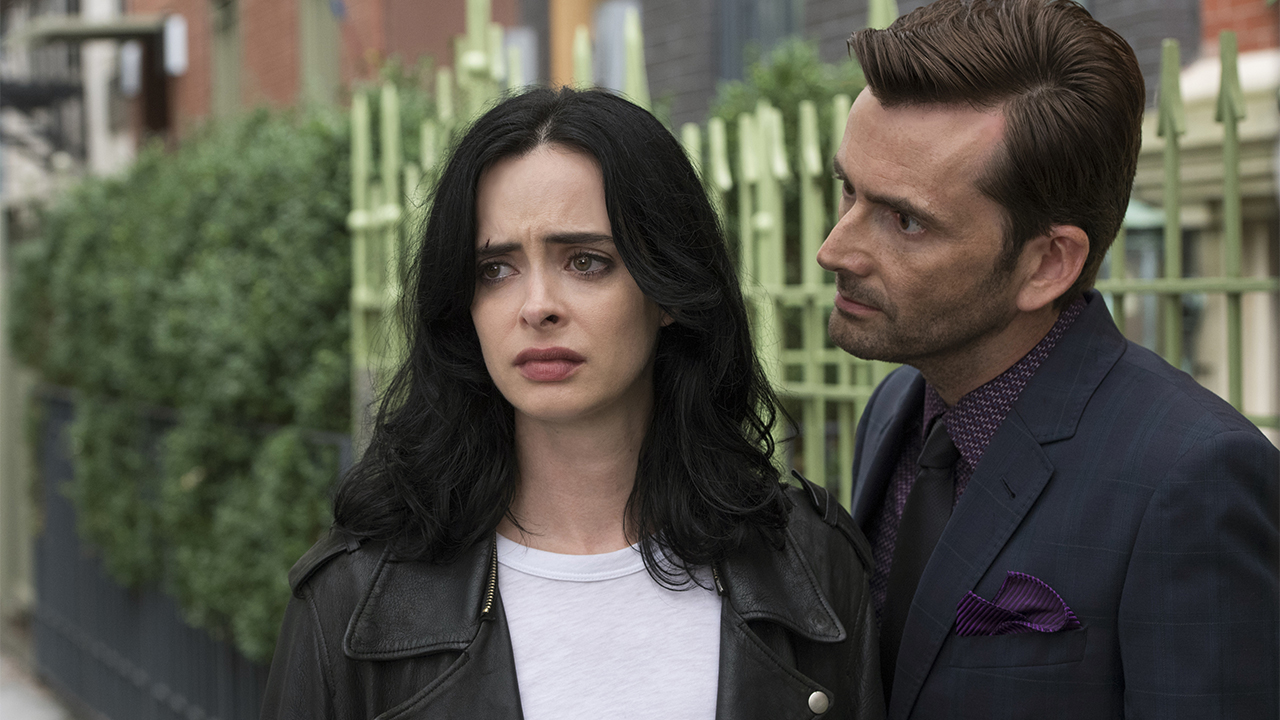
A lot of people are going to struggle with the fact that there isn’t really a main villain in season 2. Jessica’s mum is certainly the antagonist of the series (and the villain to everyone else), but the fact that she’s the hero’s mother stops her from ever becoming the true baddie most superhero shows/movies have. It’s as if the showrunners knew they were never going to top David Tennant’s Kilgrave and so didn’t even try, instead opting to make Jessica’s own fears and demons the main obstacles she has to overcome. I quite enjoyed this unconventional set-up and the series genuinely has me wondering if we really need straight up villains in our superhero stories, but there’s no denying the fact that it doesn’t make for spectacular TV. Even a character-driven series such as Jessica Jones will struggle to find mainstream popularity without a traditional villain, and despite Jessica’s emotional victories, which are perhaps more gratifying, most fans will feel unsatisfied.
At its core, Jessica Jones season 2 does best what its first season did so well; presenting an honest yet entertaining depiction of the female experience, even when it’s painful and messy. It’s equally all about Jessica and not at the same time - she’s merely the mirror for the world we live in and female fans in particular will strongly resonate with the storylines of sexual abuse, female friendships, and family drama. But it doesn’t stop there. Not merely satisfied with highlighting what’s traditional known as ‘women’s issues’, the show also addresses homelessness, drug abuse, homophobia, and more in season 2. While there isn’t time to delve deeply into each of these topics individually, it’s refreshing to see a show refuse to ignore other issues in favour of focusing on one central theme. In a lot of ways, Jessica Jones season 2 is a very political watch.
While the second season lacks the flair of the first and is definitely too long (you only need 10 episodes Netflix!), it manages to hold true to what made Jessica Jones so watchable in the first place. Just about. It’s not as thrilling seeing it all for the second time around, but thanks to Janet McTeer and some truly interesting secondary storylines, Jessica Jones season 2 is definitely worth your precious TV watching time.
Lauren O'Callaghan is the former Entertainment Editor of GamesRadar+. You'd typically find Lauren writing features and reviews about the latest and greatest in pop culture and entertainment, and assisting the teams at Total Film and SFX to bring their excellent content onto GamesRadar+. Lauren is now the digital marketing manager at the National Trust.
